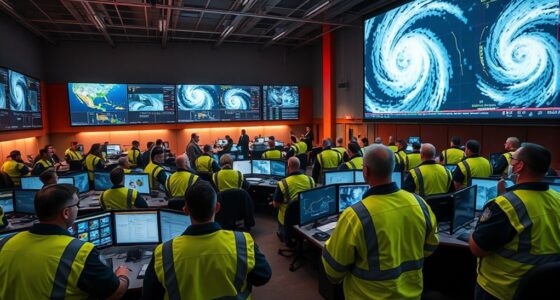Climate Week and the UN Climate Summit are closely linked events focusing on global climate action. Climate Week raises awareness and mobilizes communities worldwide, while the summit gathers world leaders to make concrete commitments and policies. Together, they promote renewable energy, international cooperation, and climate finance. Their connection helps accelerate progress toward a sustainable future. Keep exploring to learn how these events influence policies and inspire global efforts to combat climate change.
Key Takeaways
- Climate Week provides a global platform for raising awareness and mobilizing action during the same period as the UN Climate Summit.
- The UN Climate Summit is a high-level event where countries commit to climate policies, often announced or reinforced during Climate Week.
- Both events emphasize renewable energy investments and international cooperation to achieve climate goals.
- Climate Week serves as a catalyst for civil society engagement and momentum leading into the UN Summit’s negotiations.
- The summit’s outcomes are often highlighted and promoted during Climate Week to accelerate global climate action.

As Climate Week unfolds and the UN Climate Summit gathers global leaders, the world watches closely to see how nations will address the urgent threat of climate change. This convergence of events creates a crucial platform where ideas, commitments, and strategies come together to shape the future of our planet. During Climate Week, you’re encouraged to pay attention to how countries showcase their efforts to promote renewable energy and strengthen climate policies—these are the cornerstones of meaningful change. The summit elevates these issues, pushing them beyond diplomatic talk to practical commitments that can accelerate the transition to a low-carbon future.
Climate Week and the UN Summit spotlight renewable energy and climate policies as key to a sustainable future.
You’ll notice that renewable energy plays a central role in the discussions. It’s not just about reducing emissions; it’s about transforming how we power our lives. Leaders highlight investments in solar, wind, and other clean energy sources, demonstrating a collective shift away from fossil fuels. This push toward renewables isn’t just a trend; it’s a necessity to meet global climate targets. As policies are announced and renewed, you’ll see a clear emphasis on integrating renewable energy into national grids, incentivizing innovation, and removing barriers that slow adoption. The importance of scaling up renewable energy isn’t just a technical issue—it’s a political one. Strong climate policies are needed to facilitate this transition, ensuring that investments are directed toward sustainable solutions.
During Climate Week and the summit, you’ll observe how climate policy becomes a tool for action, not just rhetoric. Countries are expected to update or submit new commitments that reflect their priorities in reducing emissions. These policies often include phasing out coal, establishing renewable energy targets, and implementing carbon pricing mechanisms. You’ll witness nations engaging in negotiations to align their policies with global climate goals, recognizing that individual efforts alone won’t suffice. The summit acts as a catalyst for these commitments, encouraging countries to set ambitious, measurable targets.
This coordination emphasizes the importance of climate policy, which is essential for turning commitments into tangible results and ensuring global accountability. The connection between Climate Week and the UN Climate Summit is clear: both events serve as a rallying point for action. Climate Week sparks awareness and mobilizes civil society, while the summit pushes governments to turn pledges into concrete policies. As someone invested in the future of the planet, you’re part of this process—your support, advocacy, and pressure can influence how these commitments translate into real change. Recognizing the significance of international cooperation is vital for amplifying collective efforts and achieving meaningful progress. Additionally, the funding for renewable projects discussed during the summit will be crucial in helping developing nations implement their climate commitments. The increased focus on climate finance demonstrates the recognition that financial support is critical for a just and effective transition. This global effort fosters collaboration across nations, which is indispensable for tackling a challenge as vast as climate change. Together, they create a momentum that can accelerate the shift toward renewable energy and robust climate policies, ultimately helping to curb the worst impacts of climate change and secure a sustainable future for generations to come.
Frequently Asked Questions
How Do Climate Week Events Influence Global Climate Policies?
You can see how climate week events influence global policies by shaping discussions around urgent issues like carbon pricing and renewable energy. These events rally leaders, businesses, and communities to commit to concrete actions, encouraging nations to implement stricter regulations and investments. Your participation and awareness help push for stronger policies, accelerating the changeover to cleaner energy sources and more effective climate solutions worldwide.
What Are the Main Goals of the UN Climate Summit?
Imagine you’re steering a ship through a stormy sea. The UN Climate Summit’s main goals are like guiding stars, helping you navigate. You focus on climate finance to fund essential repairs and set renewable targets to steer toward calmer waters. These goals aim to unite nations, reduce emissions, and guarantee a sustainable voyage for future generations. You’re the captain, and these objectives help chart a course for a healthier planet.
How Do Local Communities Participate in Climate Week?
You can participate in climate week by engaging in community-led initiatives and grassroots activism. Attend local events, support sustainable projects, or organize cleanups and awareness campaigns. Your involvement helps amplify the voices of your community and promotes local solutions to climate challenges. By taking action at the grassroots level, you contribute to broader climate goals and inspire others to join the movement for a healthier planet.
What Role Do Youth Initiatives Play During These Events?
You see youth initiatives as a powerful force, blending hope with urgency. Youth leadership and student activism energize events by pushing for bold climate actions and inspiring change. While seasoned experts discuss policies, young voices challenge and amplify the message, making the issues relatable and urgent. Their participation sparks innovation, fuels momentum, and reminds everyone that the future depends on today’s youth taking a stand.
How Are Corporate Commitments Showcased at the UN Climate Summit?
You see corporate commitments at the UN Climate Summit through key actions like sustainability reporting and demonstrating corporate accountability. Companies showcase their efforts by presenting detailed plans and progress on reducing emissions, adopting renewable energy, and implementing sustainable practices. These commitments highlight their dedication to climate action, inspiring others to follow suit. You can observe how transparency and accountability are essential for building trust and encouraging impactful corporate participation in global climate initiatives.
Conclusion
Just like two sides of the same coin, Climate Week and the UN Climate Summit work together to spark global change. By attending Climate Week, you get a front-row seat to inspiring ideas and urgent action. The summit then turns those conversations into commitments that can reshape our future. Together, they’re like a powerful engine driving us toward a healthier planet. Your voice matters—join the movement and be part of the solution.









